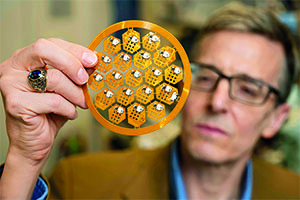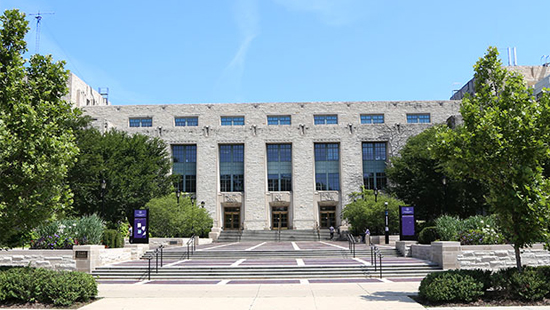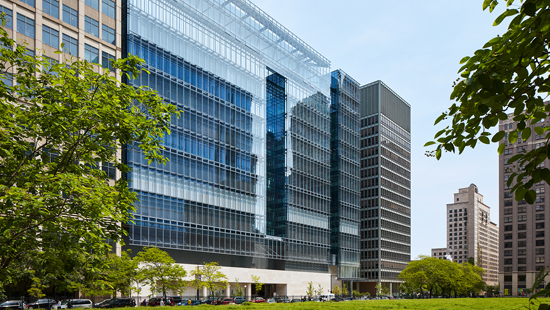About QSIB
The Center for Bio-Integrated Electronics (CBIE), founded in 2016 as part of the Simpson Querrey  Institute for BioNanotechnology (SQI), was established to support fundamental, applied, and translational research on the development of new, bio-compatible forms of electronics with unique functionality of critical relevance to human health. CBIE was created as part of the recruitment of Professor John Rogers from the University of Illinois at Urbana-Champaign to Northwestern University, to accelerate interdisciplinary activities at the interface between engineering and medicine, with an orientation toward biomedical technologies with capabilities for improving the effectiveness and reducing the cost of clinical medicine. Northwestern University trustees Louis A. Simpson ’58 (’96 P) and Kimberly K. Querrey (’22, '23 P) provided an endowment to help support these programs.
Institute for BioNanotechnology (SQI), was established to support fundamental, applied, and translational research on the development of new, bio-compatible forms of electronics with unique functionality of critical relevance to human health. CBIE was created as part of the recruitment of Professor John Rogers from the University of Illinois at Urbana-Champaign to Northwestern University, to accelerate interdisciplinary activities at the interface between engineering and medicine, with an orientation toward biomedical technologies with capabilities for improving the effectiveness and reducing the cost of clinical medicine. Northwestern University trustees Louis A. Simpson ’58 (’96 P) and Kimberly K. Querrey (’22, '23 P) provided an endowment to help support these programs.
In 2019, Kimberly and Lou gifted additional funding which, combined with prior support, created the Kimberly K. Querrey and Louis A. Simpson Institute for Bioelectronics (QSIB) that now houses the CBIE. QSIB provides funding and infrastructure to facilitate the development of biocompatible electronic, photonic, and microfluidic technologies for the human body, across a broad scope of applications, including those not only in medicine and human health but in rehabilitation, sports, fitness and general wellness, and in research on living systems more broadly.
CBIE now serves as the “hub” of QSIB, providing the materials science and technology foundations for multidisciplinary collaborations at the intersections of engineering, science, and medicine. A number of other future centers in medicine, rehabilitation, sports and other areas will serve as the “spokes” of QSIB. This structure will enable translational science across a broad variety of applications affecting human health and the human condition generally.
In 2022, QSIB was further strengthened through receipt of a gift from the Louis Simpson Trust. This gift came with great sadness, as friend and advisor Louis A. Simpson passed away on January 8, 2022. “I am truly blessed to have had the privilege of Lou’s friendship for nearly a decade - an individual of tremendous talent, accomplishment and wisdom who dedicated the latter part of his life to philanthropy and mentorship, revolving strongly around education and medicine. His commitment to Northwestern generally, and to our programs here at the institute specifically, will be felt by students, faculty and staff for many generations to come,” said QSIB Director John Rogers.
All members of QSIB thank Kimberly and Lou (d. 2022) for their generous support and their strong belief in our mission.
Mission Statement
To pursue scientific and technological breakthroughs in electronics, optoelectronics, and microfluidic systems that have the potential to improve human health or enhance our understanding of living systems.
Laboratories
QSIB has two primary locations, each recently constructed with world class, state-of-the-art research facilities. The first is on Northwestern’s Evanston Campus, occupying two complete floors of the A/B wing within the Technological Institute (Tech). The second is in the heart of the Chicago medical campus on the 11th floor of the new Simpson Querrey Biomedical Research Center (SQBRC). SQBRC is the largest dedicated biomedical research facility in the United States.

Technological Institute (Tech)
- Class 1000 cleanroom
- Microscopy/imaging studio
- Fluidics laboratory
- Radio frequency (RF) device testing lab
- Mechanical & electronic assembly and testing
- Elastomeric device encapsulation area
- Makers prototyping & development lab
- Automated electronic device production area
- Physiological flow sensing laboratory

Simpson Querrey Biomedical Research Center (SQBRC)
- Class 1000 cleanroom
- Photography/imaging studio
- Clinical device simulation lab
- High speed laser imaging laboratory
- Electronic assembly and testing lab
- Elastomeric device encapsulation area
- Makers prototyping & development lab
- Automated electronic device production area
- Clinical trial device center
- Software programming/computational area
Join
QSIB hosts approximately 150 researchers per year, including undergraduates, MS students, PhD students, MD/PhD students, MD students, postdoctoral fellows, and visiting scientists/students. If you are interested in joining the group, please contact John Rogers for more information.


 Institute for BioNanotechnology (SQI), was established to support fundamental, applied, and translational research on the development of new, bio-compatible forms of electronics with unique functionality of critical relevance to human health. CBIE was created as part of the recruitment of Professor John Rogers from the University of Illinois at Urbana-Champaign to Northwestern University, to accelerate interdisciplinary activities at the interface between engineering and medicine, with an orientation toward biomedical technologies with capabilities for improving the effectiveness and reducing the cost of clinical medicine. Northwestern University trustees Louis A. Simpson ’58 (’96 P) and Kimberly K. Querrey (’22, '23 P) provided an endowment to help support these programs.
Institute for BioNanotechnology (SQI), was established to support fundamental, applied, and translational research on the development of new, bio-compatible forms of electronics with unique functionality of critical relevance to human health. CBIE was created as part of the recruitment of Professor John Rogers from the University of Illinois at Urbana-Champaign to Northwestern University, to accelerate interdisciplinary activities at the interface between engineering and medicine, with an orientation toward biomedical technologies with capabilities for improving the effectiveness and reducing the cost of clinical medicine. Northwestern University trustees Louis A. Simpson ’58 (’96 P) and Kimberly K. Querrey (’22, '23 P) provided an endowment to help support these programs.